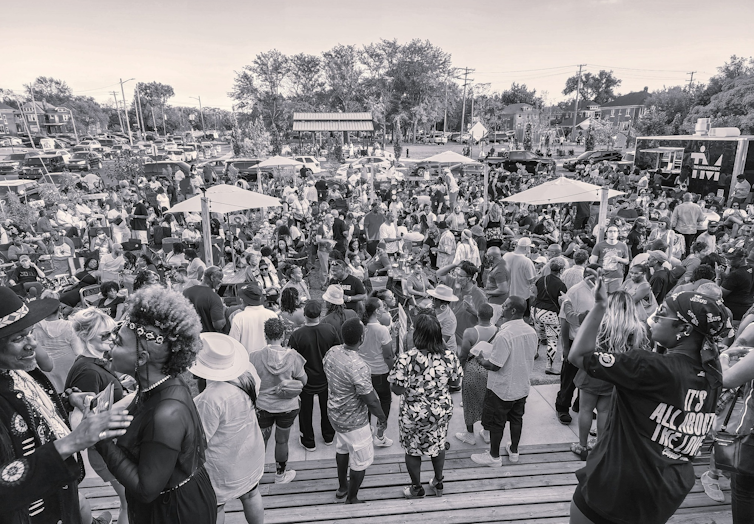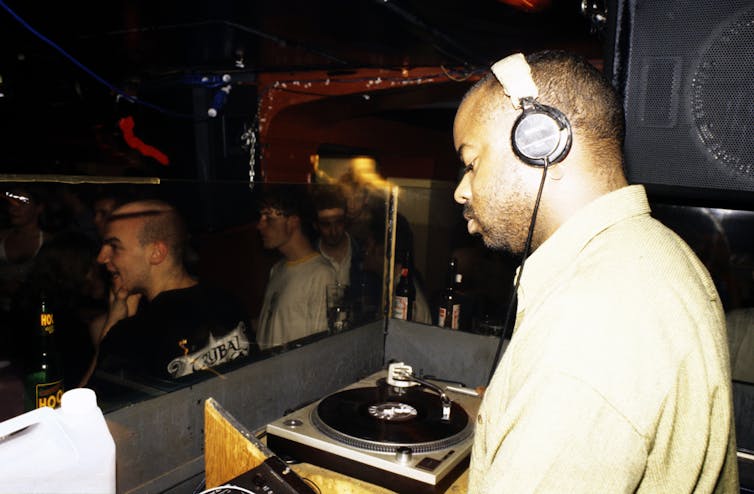For over 20 years, Detroit has celebrated its standing as a result of the birthplace of techno with an digital music competitors held over Memorial Day weekend.
Nonetheless just like the city spherical it, the competitors has modified. At its inception, the event was free and focused on techno music and Detroit musicians, primarily the Black People who started techno – merely as house music was rising in Chicago – inside the mid-Nineteen Eighties. Now, the worth of a weekend ticket is US$309, plus a $46.15 service cost. And some festivalgoers have well-known it not attracts as many Black attendees as a result of it as quickly as did or as one would rely on, given the racial make-up of the city. It has prolonged since dropped “Detroit” from its determine, rebranding as a result of the Movement Digital Music Pageant in 2006.
Briefly, to many Detroiters, the annual competitors has gentrified, as have the central corridors of the city.
As an ethnographic researcher of Detroit techno – and a self-confessed “househead” – I’ve watched because the city and its music have modified as more and more Black Detroiters have been pressured out by rising rents. Nonetheless I’ve moreover seen how the city’s underground music scene is combating once more by preserving group inside the face of spatial injustice – that is, the unfair allocation of sources in a mixed society – and the pressures of systematic racism.
One such space of resistance happens every Thursday all through the summer season season at The Congregationa restaurant inbuilt a former church positioned one block from the epicenter of Detroit’s 1967 revolt – which seen days of confrontation between police and predominantly Black residents.
At The Congregation, a grassy dance flooring attracts an intergenerational and varied crowd. The event retains the spirit of outdated Detroit alive, whereas offering newcomers a imaginative and prescient of what a really inclusive metropolis can seem like.

Marius Bingue, CC BY
Techno is Black music (from Detroit)
Detroit is known universally as a result of the birthplace of techno. The model emerged inside the Nineteen Eighties, when the Rust Belt metropolis was experiencing white flightwidespread disinvestment and the outcomes of postwar authorities functions, resembling metropolis renewal and freeway developing, that had been damaging to group desires.
As one techno musician from once more in lately instructed me, techno was the soundtrack they heard of their head whereas strolling, and looking over a shoulder, in principally abandoned downtown streets.
Techno emerged from two interrelated scenes: Black, gay golf tools and the Black highschool celebration scenethe place people, some too youthful to drink, organized elaborate events with expert light reveals and sound strategies.
Within the meantime, inspiration and encouragement moreover acquired right here from the music being carried out by the Electrifying Mojoa radio DJ whose nightly current demonstrated Detroit’s extensive number of musical tastesfrom Parliament to Peter Frampton to the B52s, and, later, techno and residential.
The vary of influences and do-it-yourself perspective of techno pioneers resembling Juan Atkins, Eddie Fowlkes, Derrick Might and Kevin Saunderson resulted in a kind of music that is every funky and futuristic, even some 40 years later. The intention of Detroit techno was, and nonetheless is, to make you dance, to make you sweat; it distinguishes itself from totally different dance music by its attribute layered rhythms, abstract sounds and Afrofuturistic themes.
Detroit techno was always rooted in sturdy group bonds – notably inside Detroit’s Black group – whatever the city being ravaged by disinvestment.
As a result of the Nineteen Eighties, numerous the varieties of digital dance music that had been impressed by Detroit and Chicago have gained mainstream recognition in Europe and white America.
Nonetheless inside the face of what some critics have labeled the “whitewashing” of the digital music enterprise – and the disproportionate earnings made by white DJs and promoters – it is vitally necessary credit score rating the Black Detroiters behind techno. And duties resembling Detroit’s Exhibit 3000the world’s first museum dedicated to techno, which opened in 2004, help promote the city’s place in rising digital music.
In return, the Detroit techno and residential scene helps preserve a approach of group and assist for Detroiters who’ve prolonged confronted systemic racism inside the metropolisand are literally encountering gentrification.
Gentrification’s danger to custom
The modifications in Detroit over the earlier 15 years have been disorienting and have had detrimental penalties for lots of longtime Black Detroiters.
Seniors have been evicted, typically with little uncoverfrom downtown buildings, which can be then redeveloped into high-end residences out of the financial attain of many Detroiters.

Brian Sweeney/PYMCA/Avalon/Getty Photographs
Within the meantime, traditionally Black neighborhoods are struggling in distinction to the booming downtown corethe place white residency elevated by 115% from 2000 to 2020.
Gentrification is a hazard to Detroit’s underground music grouptoo. Not solely is it making residential and enterprise areas unaffordable for longtime residents, nevertheless cultural communities are moreover threatened.
The highschool celebration scene that incubated techno was doable on account of there was so much downtown space in Nineteen Eighties Detroit. That space has been squeezed by gentrification.
‘Are you going to The Congregation?’
In response to the squeeze of gentrification, Detroit’s underground music scene has saved vibrant by creating areas for weekly pop-up events.
I attended the very first house night at The Congregation within the summertime of 2020. With an enormous, grassy entrance yard, it was glorious for social-distanced dancing all through the pandemic. The three resident DJs who host the event – Marvin Prather, John Spears and Tony Dennis – are lifelong Detroiters who herald customer DJs, along with Eddie Fowlkes, who helped originate Detroit techno.
Over the 4 years of its existence, house night at The Congregation has flip right into a gathering place for people who had been part of the Nineteen Eighties techno scene – predominantly Black Detroiters now of their 50s and 60s.
I uncover it excellent that the group has maintained these connections over the various years, and that the dancers and DJs who had been there from the beginning nonetheless draw inspiration from their participation.
However it’s a welcoming, inclusive group that comes with newcomers – just because it did after I first moved to Detroit from California in 1998.
It is, concurrently, a homecoming with a family cookout vibe, a unbelievable place for a weekly catch-up or a banger to work up a sweat dancing.
Midway via one such evening ultimate summer season season, a youthful Black woman near me on the dance flooring shouted with shock, “Dad! Dad! Dad!” after which walked alongside the fence to greet a Black man, possibly a bit older than me. The reality that every attended the event – and had been happily shocked to see each other there – demonstrates the way in which wherein via which Detroit’s music scene continues to convey generations collectively. And The Congregation is just one such venue. On any given night, the frequent crowds on the 4 necessary dance music venues in Detroit are liable to be varied in races, ethnicities, sexualities and – in distinction to the norm in digital music events worldwide – age.
All through the final file carried out on the ultimate Thursday event of summer season season 2023, considered one of many DJs, Taz, acted as MC and requested the group to take out their telephones as one different DJ, Mark Duncan, was participating in “Flashlight” by Parliament.
Many inside the crowd shined their cellphone flashlights as they danced and sang alongside.
That sense of group is what makes events resembling those that occur at The Congregation one factor that househeads like myself miss from summer season season to summer season season – and concern could also be edged out totally inside the face of gentrification.
I am counting down the instances until it begins this yr on June 6. In a gentrifying metropolis, areas like The Congregation signify every continuity and an honoring of all which have come sooner than: the Black people who created techno and residential, the Detroiters who didn’t depart a disinvested metropolis, and the fierce creativity that’s nonetheless considered one of many metropolis’s necessary attracts.
